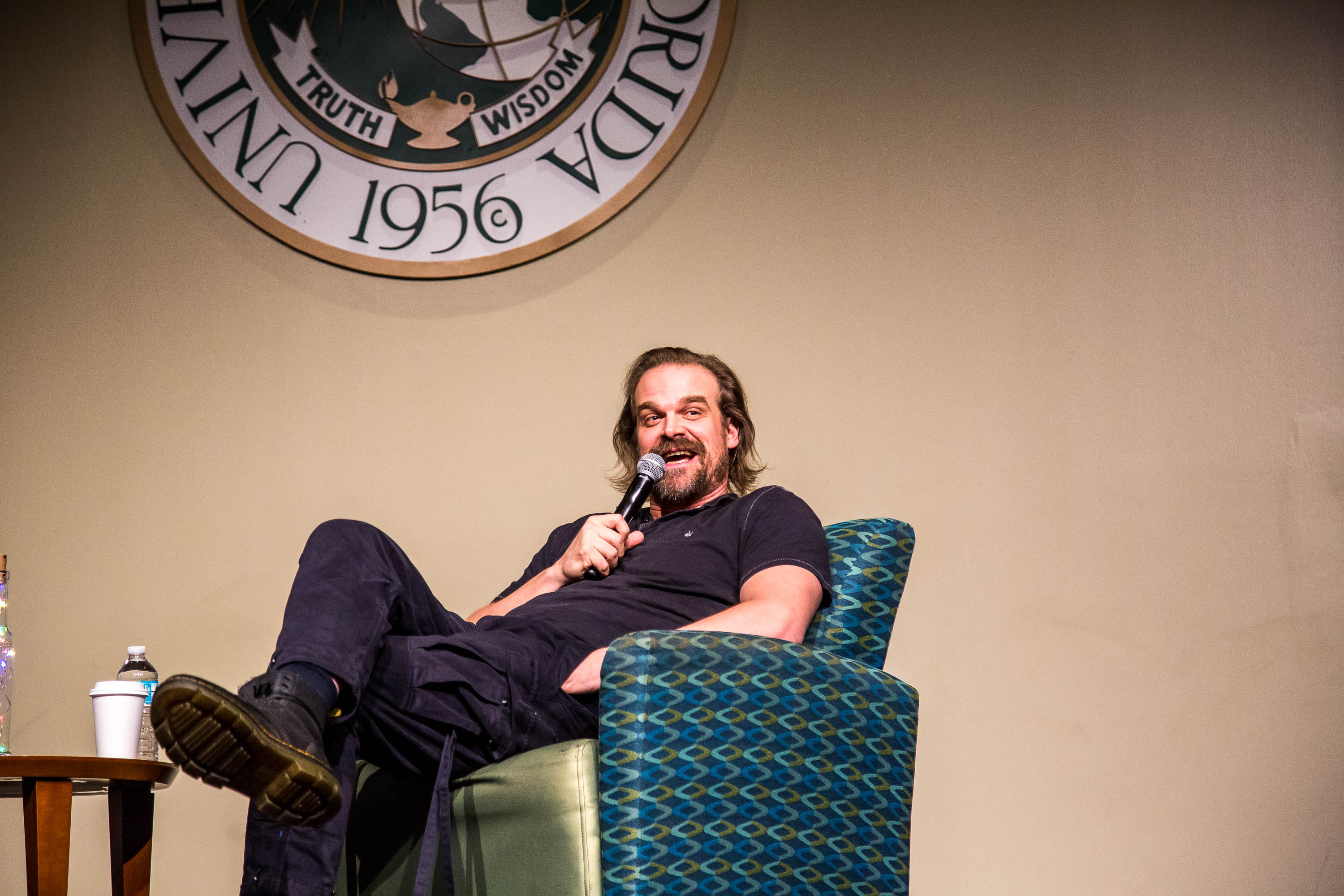Harbour embraces life’s ‘weirdness’ as key to recovery

Famously known for his role in “Stranger Things” as the chief police officer Jim Hopper, actor David Harbour shared his life experiences dealing with mental illness and his hardships in the film industry at the University Lecture Series Wednesday night.
The mental health advocate shared to an audience of more than 800 people in the Marshall Student Center Ballroom how he coped with his bipolar disorder by embracing his “weirdness.” He also touched on his transition from acting in small plays to trying bigger roles on TV after graduating college.
“I did a lot of heroin,” he joked. The audience got caught up in laughter.
“I really did struggle and I think, you know, part of that was having to learn a new language,” Harbour said. “And that was very assaulting because I really thought I came from this bubble of Dartmouth and I sort of thought very highly of myself. And then, when I got to New York City, they didn’t think as highly of me as I thought.”
Rejection played a significant part in Harbour’s life as, at the beginning of his career, he began starring in small off-Broadway plays while trying to pay his bills in New York City.
Harbour said that he felt like an outcast while trying to pursue his passion when comparing himself with the success of his high school friends.
“When I was 30, I was still only making $25,000 a year and living in a studio in NYC not knowing if I would pay next month’s rent,” Harbour said.
After the first few years in the industry, Harbour started acting in supporting roles in movies and starring in Broadway plays, such as “Who’s Afraid of Virginia Woolf?” and “The Rainmaker.”
However, he got to a point in his life where he almost gave up his acting career.
Tired of continuously getting small roles while struggling to pay the bills, Harbor said that he started pulling back from the industry where his heart resided.
Harbor said that he was also feeling neglected and unwanted by the industry due to his age.
But when the opportunity to star in an ‘80s-themed TV show came up, his life completely turned around.
“I eventually got tired and I was about to pull back when a leading TV role came my way with ‘Stranger Things,’” Harbour said. “That was a really extraordinary moment — a huge transitional phase in my life.
“As I was 40, I thought they were giving me an opportunity as just a courtesy thing,” Harbour said. “When I finally got the role of Hopper, it really reinvigorated my entire experience and my ideas about movies and TV. This TV show truly blew me wide open and made me want to tell more stories in that way.”
Ranked as one of Netflix’s most-watched shows, “Stranger Things” came out in 2016 and has since attracted an audience of millions throughout its three seasons. Harbour described his character, Chief Hopper, as an arrogant but lovable character who is not afraid to show his messy and complex side.
When talking about his role as Hopper, Harbour reflected on embracing the imperfect, ugly and complex side of everyone’s lives. He highlighted the importance of embracing each other’s weirdness and how that can take pressure off societal expectations.
“We are all walking around utterly confused about what we are doing and being aligned with the fact that we are all going to die,” Harbour said. “It’s a crazy experience that we are all dealing with. If we embrace our weirdness, then the pressure goes off us.
“The things that we think are unlovable about us are generally some of the most lovable things about us.”
It was not until the Q&A that Harbour touched on his struggles with mental health.
The mental health activist revealed to the audience when he had a manic episode three days before the September 11, 2001 terrorist attacks and how the episode shifted the direction of his life afterward. He interpreted the attacks as a hallucination from the episode and became detached from reality.
Ever since then, Harbour said that he has had several institutionalizations and has been on and off medications for the last 18 years.
He said that his journey in the psychiatric system led him to become an activist for mental health.
“It has been a very complex ride through the psychiatric system, which is not a very pleasant system,” Harbour said. “We started outsourcing the problem by creating orphanages, prisons and mental health asylums. These are these institutions that were created to outsource our community problems are things that capitalism viewed as a problem.”
Despite the hardships encountered throughout his life, Harbour said that he still fights to end the stigma and the divisions that separate marginalized groups in society.
“I do know that being a human being, everyone should be allowed to have breakdowns, be weird, be strange and have problems,” Harbour said. “You shouldn’t feel ashamed of being who you are and making mistakes. I will say we are all broken and we’re all in that same boat. Anybody that says they have it figured out, it’s not true.”







